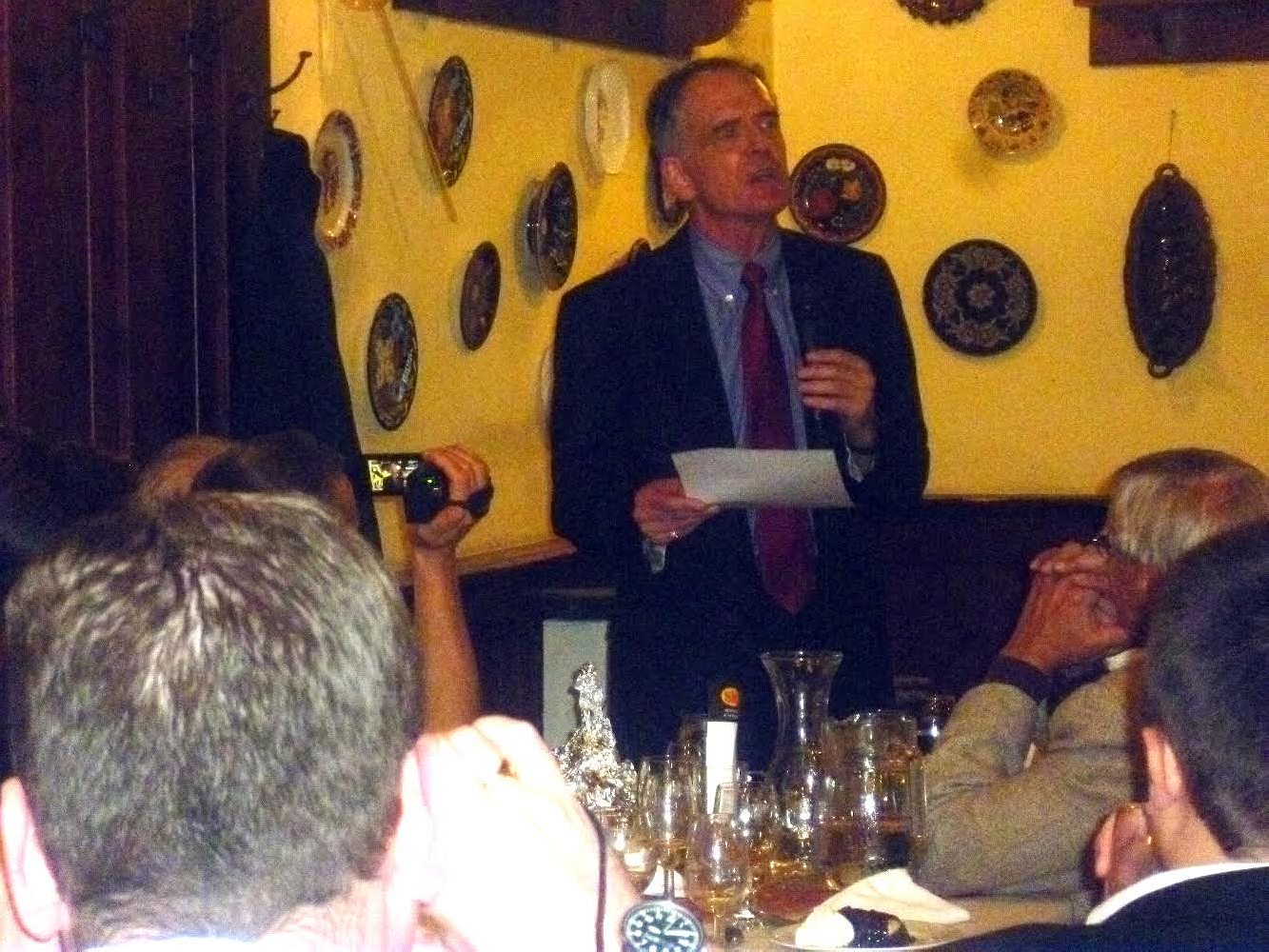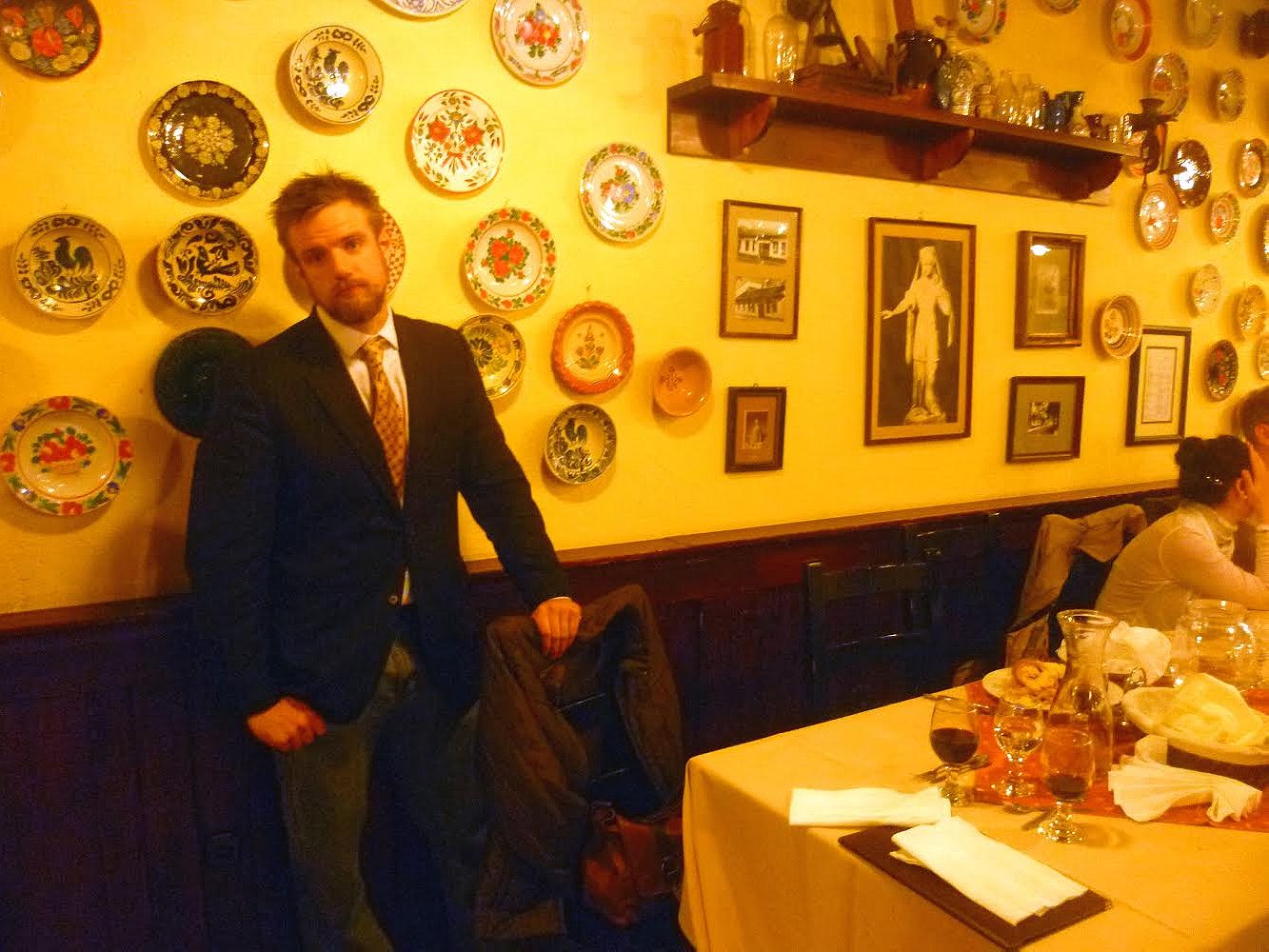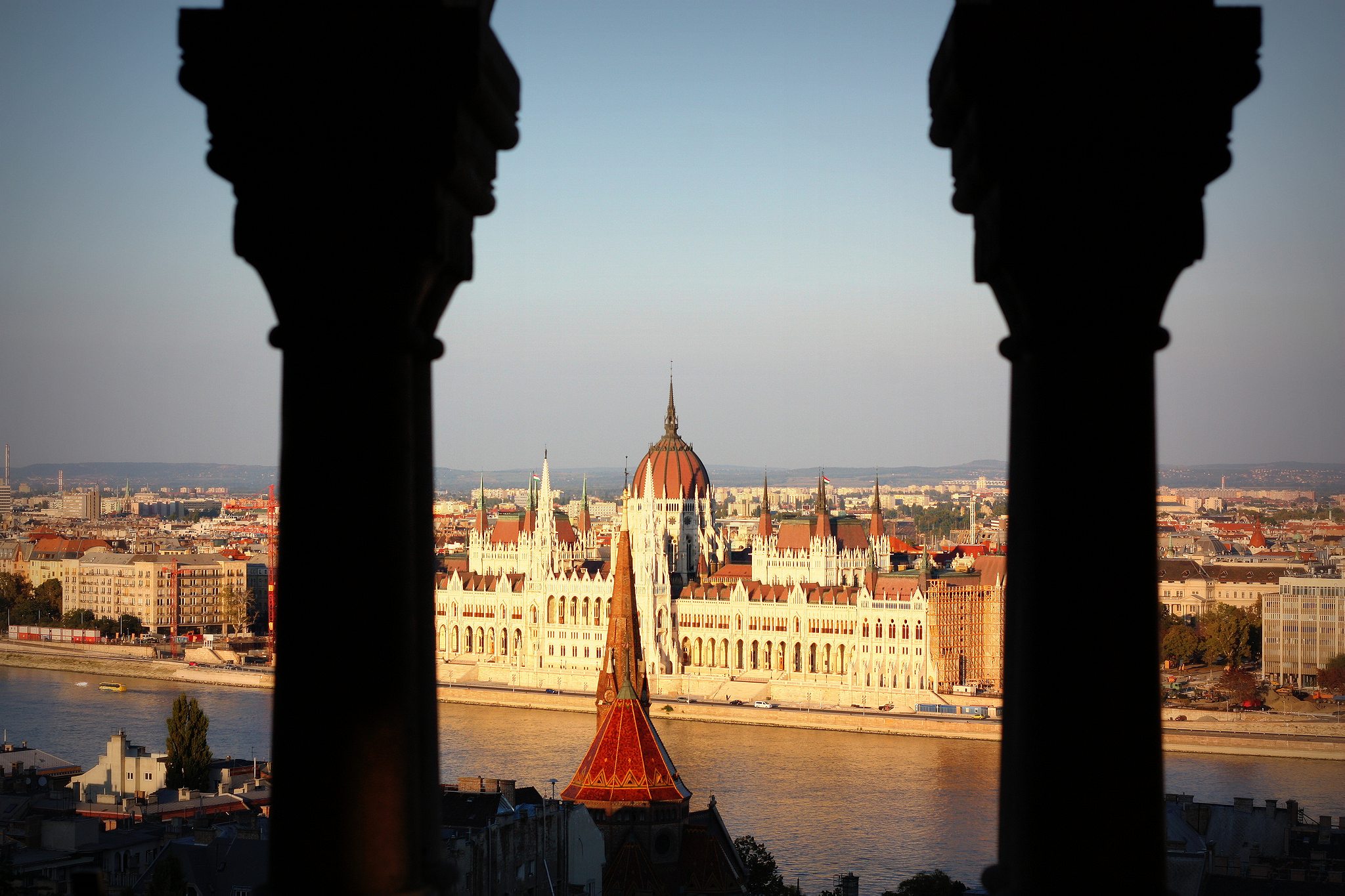Europe’s white nationalists, led by a man from Montana, meet in Hungary to plot over pints. It does not go well.
BUDAPEST, Hungary—
“I’m beginning to rethink my decision of becoming a nationalist to meet girls,” jokes a young man in a blazer and bowtie, sitting at the head of an all-male table of well-dressed, intellectual-looking 20-and-30-somethings in a wood-paneled Budapest bar.
The conversation veers from lamenting the bar’s shortfall of Viking goddesses to the future of white identity across the West.
The informal pub get-together last week was a precursor to the Future of Europe Congress, a white nationalist event organized by the Montana-based National Policy Institute (NPI). Many attendees were part of the Identitarian movement, a pro-white, anti-Muslim, and anti-globalist ideology that began in France in the early 2000s and has been rapidly growing among European youth. The conference was advertised to feature white nationalist speakers and alternative-right figures from Europe, the U.S., and Russia.
The organizer was NPI director Richard B. Spencer. Dressed in stately attire and double-buckle dress shoes, with a black notebook reading “Field Notes” on its cover, Spencer greets incoming pub night guests with a handshake and smile. The conference had been postponed after Hungary’s Prime Minister Viktor Orbán said he would use “all legal means” to prevent it from taking place. Hungary’s authorities, sensitive about the rising popularity of far-right party Jobbik and a recent statement by Orban on the possibility of establishing “an illiberal new state based on national foundations,” likely sought to distance themselves from the far right and bolster EU credentials with the crackdown.

Labeled white supremacists and crazed bigots by many in the foreign and Hungarian media, Spencer’s conference was under fire from the start.
Hungary’s interior minister Sándor Pintér announced he would deny entry to conference speakers “well-known for spreading racist views,” and made good on that statement, stopping many from coming for fear of arrest and deporting one, William Regnery, of the right-wing Regnery publishing family. The arranged hotel venue canceled NPI’s booking and many guests’ reservations, while Jobbik, Hungary’s radical right party, which polled at 21 percent in Hungary’s April election, bowed out several days prior after initially agreeing to participate.
Spencer remained resolute against what he sarcastically termed “the forces of diversity and tolerance,” and assured registrants wryly that “we shall overcome” in a video entitled “Perseverance,” posted September 29 on his second website, Radix Journal.
Orbán has declared Spencer a national security threat
With the government warning in mind, Spencer flew to Austria instead and entered Hungary by train, slipping Orbán’s clutches along with some 70 conference attendees. But late on the night of the gathering, dozens of armed Hungarian police swarm the pub, demanding identification from anyone they believed to be associated with the event. For hours nobody is permitted to leave.
“It’s a fun party,” one bartender jokes as she pours a foaming mug of beer.
Spencer is less amused.
He wonders aloud what to do, while other attendees get a lot of unwanted one-on-one attention from the red-hat-clad police about their names and nationality. Upon identifying Spencer, police detain him at the scene and take him to jail, purportedly for failing to produce his passport. (After several days of being shuttled between an airport detention center and immigration facility, Spencer is informed that Orbán has declared him a national security threat to Hungary. Spencer later e-mails me from a low security Hungarian detention center and tells me he will soon be deported from Hungary and banned from entering all Schengen countries for three years.)

Spencer’s entourage is stunned, but soon a new plan is hatched high up in the echelons of Identitarianism—or more like among Spencer’s friends, such as Kevin DeAnna, who was staying with him at a hostel after having to leave the hotel they had originally booked.
DeAnna took over logistics after he heard about Spencer’s arrest, doing his best to help out, running on minimal sleep or information.
The next afternoon, participants and media gather at a pre-arranged meeting spot at a Budapest metro stop. DeAnna arrives a few minutes late, with spiky hair and a panicked expression.
“We’re kind of running this underground as a guerilla movement now,” DeAnna tells gathered media and would-be-attendees with a nervous laugh. “But right now by trying to be inconspicuous we’re being about as conspicuous as possible,” he adds, glancing around the metro entrance past a pizza place and a shop selling tabloid magazines. His expression carries the urgency of a character in an episode of 24.
Small groups eventually split off to head to the conference’s clandestine site: a traditional Hungarian restaurant nearby, featuring long tables and ambient lighting. Attendees include well-dressed men and a few women; Flemish nationalists with black, red and white-striped sashes from right-wing student organizations; older academic types; and others of a variety of ages and nationalities. They dine on a sumptuous Hungarian dinner of chicken paprikash, brick-red sauce on a bed of noodles with grilled chicken, followed by a roster of traditional Hungarian desserts.
Some diners bear a resigned demeanor. “We ate a slice of pizza before we came,” says Jack, a friendly-looking American dressed in a beige suit who now lives with his Hungarian wife in Budapest. “Just in case we got arrested or something.”
The attendees’ motives and opinions vary as greatly as the dessert selection.
NPI’s slogan reads “For our people, our culture, our future,” but explicit statements of white superiority are not common at the conference.

For all the buzz about the conference and its racist roots, I’m disappointed not to spot any large Nazi banners salvaged from Castle Wolfenstein, or any SS insignia on lapels. In fact, some attendees express token support for Israel and minorities, holding as part of their nationalist beliefs that all peoples have the right to their own ethnic self-determination.
The undercurrent, though, is that Caucasians around the world deserve better and have to make changes if they want to survive against a rising tide of non-white Third World immigration and inside betrayal. Media and political critics from the left and right see the “movement,” as many attendees and speakers call it, as a pseudo-scientific, more academic version of your standard white supremacist outfit.
Pèter from Hungary shows me his Facebook page in support of pro-Russian separatists in eastern Ukraine, saying he is disappointed that the proposed speaker, Aleksandr Dugin, a Russian nationalist and former adviser to the Putin government, is not able to attend.
Some describe U.S. foreign policy as hostile to whites. Others discuss the perceived threat of mass immigration and influence from Muslim countries, or what they see as undue Jewish influence in world affairs. Others think Western whites seem to have simply lost their mojo.
One man with a goatee and a glass of wine, who identifies as an atheist, says he wishes people would stick to the big issues like stopping overwhelming non-white immigration before getting into the topics like theocracy, deeper cultural identity, or conspiracy theories about Jews.
“It’s the old mainstreaming versus vanguardism debate,” a young man from Czech Republic chimes in.

After the dinner, Tomislav Sunic, a former Croatian diplomat and American citizen who heads the American Freedom Party (formerly American Third Position) speaks. He argues that Western societies are in the grip of “a kind of self-censorship,” where citizens and especially students worry that speaking out about the scientific rationale behind racial separation or the importance of ethnicity will have them ostracized or even adversely affect their academics or livelihood.
He claims Third World immigration is largely encouraged by the lobbying and interests of multinational corporations to import “cheap labor” and devalue existing domestic European and white labor value. He also calls out the Catholic Church for asking historically white nations to accept illegal non-white immigrants on the supposed basis of Christian compassion.
It is also possible I’m being followed
Last up is Jared Taylor, the Yale-educated editor of American Renaissance website and former director of NPI. “From a cultural and a genetic point of view, immigration is no different than armed invasion,” he tells the crowd like kindly grandfather explaining to his grandchildren the dangers of a chainsaw.
The 70 or so guests listen closely as dishes clanked in the background.
“Our governments are permitting millions of aliens to flood into our countries. They do not seem to understand that the most treasured possession we have is our culture and the genetic heritage that makes that culture possible,” Taylor says. “We must therefore all of us be comrades for this great struggle in the defense of everything we love!”
The crowd rises in a standing ovation. Taylor is moved.
Sipping from a frosty pint glass after dinner, Taylor has regained his composure and says he hopes he won’t be arrested on the way back to his hotel. He has brought a briefcase he filled with clothes, toothbrush, and his passport. “I just didn’t know if I might have to leave directly from here,” he says. “It is also possible I’m being followed.”
[Header image: Széchenyi Chain Bridge, Budapest, Hungary, by SF Brit, used under CC BY-ND 2.0]